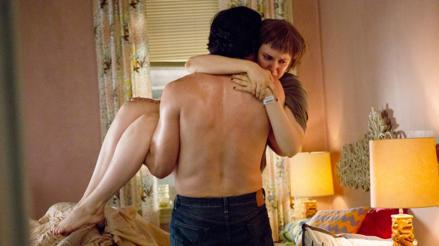Not long after the second season of Girls ended, Central Casting New York put out a call on its Facebook page for several new, seemingly minor characters HBO wanted to cast for Season 3. The Facebook post has since been taken down, but not before several sites reported what the network was looking for. Above all: patients. Some fat, some thin, some black, some white. Also someone to play “an alcoholic with teased hair” and someone else to be a “chainsmoking nurse.” Your assumption is probably the same as everyone else’s: Someone on Girls is going to rehab.
Who? Presumably Hannah or Adam, or both—though Jessa is a possibility, and I suppose Shoshanna could be a dark horse. But really, it’s probably Hannah or Adam. Perhaps the latter will go to more A.A. meetings (partly filled by women with teased hair) and the former will check into a hospital (where she will meet a “well dressed business man” and a man between “30-38 with tattoos and ear spacers”). In any case, the personal problems evident in the last few episodes of Season 2 are almost certainly far from over.
That wasn’t entirely clear to some viewers, given the sweeping, pounding, romantic finale, in which a shirtless Adam raced down the streets of Brooklyn and then lifted Hannah from her bed and smooched her. “Between this and Silver Linings Playbook,” Molly Lambert wrote at Grantland, “it’s been an unstoppable year for romanticizing mental illness with happy endings that pretend you will be magically fixed as soon as you just find someone to love you.” Los Angeles Times writer Meredith Blake wrote that, with Hannah and Adam’s “sentimental and semi-absurd reunion,” Girls had “suddenly—and not altogether convincingly—morphed into a romantic comedy.” Evan Kindley pointed out at the Los Angeles Review of Books that the main relationships (Adam-Hannah, Marnie-Charlie, Shoshanna-nobody, Jessa-elsewhere) had returned to where they were when the show began, making Girls seem more like “a traditional sitcom than the long-arc dramatic shows that HBO is famous for.”
But I’m more taken with a comparison made by one of Kindley’s fellow LARB writers, Lili Loofbourow, who likened the season finale to a particularly brilliant bit by the great stand-up Maria Bamford (who, if there is any benevolent force in the universe, will be asked to play a part in Season 3). Bamford has a routine in which she does some material that she usually saves, she says, for audiences that don’t get her. She speaks in the voice of a stereotypically loud female comic and makes warmed-over jokes about the war between the sexes. (“Men are from Mars and women want your penis, am I right?”) Bamford punctuates the complacent jokes with cries for help (“I’m empty inside! I’m a husk! I can’t feel my hands!”). On her one-woman Web series, Bamford adds the audience, who shout out their pleased reactions, things like, “That is so part of the paradigm that I understand! God damn it!”
The argument of this analogy is that Lena Dunham, in the Season 2 finale of Girls, is actually satirizing what she seems to be serving up. I don’t quite buy that. But I do think we’re supposed to see the cracks in the rom-com facade of the episode. Dunham’s approach might even be more ambitious than straightforward satire, insofar as it’s closer to actual experience. That moment when a messed-up guy who treats your heart “like monkey meat” comes bursting through the door because you, in a desperate moment of weakness, called him up and passive-aggressively insisted that he come help you? It might very well feel romantic. And if you’re the guy running through the streets, yelling at cars, and keeping FaceTime open so your once-and-probably-future lover doesn’t lose hope? You probably feel like a hero. The internal music does swell. And, adrenaline flowing, you think you can break down doors and lift her up and so on and so forth.
Is Dunham wrong to make that enjoyable given the likely consequences? I don’t think so. A bit manipulative, maybe—like her character—but as I told Seth Stevenson when we were discussing the finale, this is just the end of a season, not of a series. And if that casting call is any indication, it wasn’t really a happy ending.
